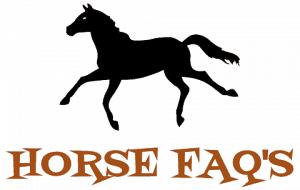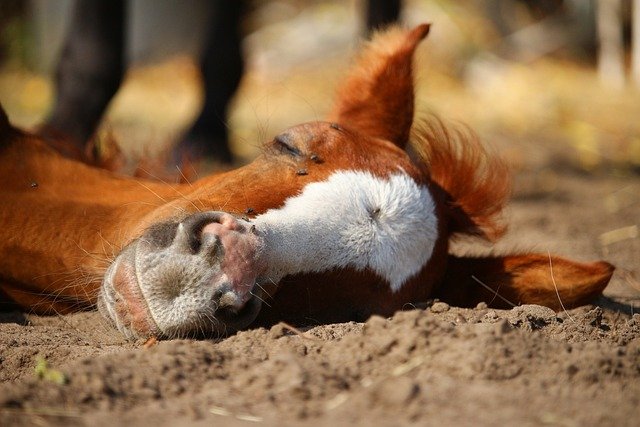Horses have a unique sleep pattern due to their evolutionary history as prey animals. As such, they typically sleep while standing up, which is known as a “doze” or “catnap”. These short periods of rest allow horses to meet most of their sleep needs while still being alert to potential dangers in their environment.
However, horses still require at least 30 minutes of deep sleep daily, which they only achieve by lying down. While this is a necessary component of their sleep cycle, prolonged periods of laying down can lead to various health complications.
In this article, we will explore the dangers of horses laying down for too long, the importance of their sleep cycle for optimal function, and the potential risks associated with sleep deprivation. Through a scientific and analytical lens, we aim to provide a comprehensive understanding of horse sleep patterns and their impact on equine health.
Why Horses Stand Up
Despite being prey animals, horses spend most of their time standing up, like vigilant sentinels, to avoid the dangers of laying down and causing potential harm to their organs and muscles. This is due to their natural instincts to protect themselves from predators.
As prey animals, horses have evolved to be constantly alert and ready to flee at a moment’s notice. Laying down for extended periods of time can leave them vulnerable to attacks, as they are unable to run away swiftly.
Moreover, laying down for too long can cause damage to their organs and muscles. Horses have a large and heavy body that can put pressure on their organs, leading to potential issues such as colic. This is why horses need to stand up and move around frequently to avoid any potential damage or discomfort.
Despite the dangers of laying down, horses still require a certain amount of deep sleep daily, which they obtain through short naps in the upright position.
Importance of Sleep
The significance of obtaining an adequate amount of rest is essential for optimal functioning. Horses require deep sleep to function correctly, and their sleep cycle consists of both lighter and deeper sleep states. Adequate rest is crucial for horses to maintain their health and wellbeing, and there are several benefits to obtaining regular periods of deep sleep.
Benefits of Deep Sleep for Horses:
- Restores energy levels
- Enhances cognitive function
- Promotes physical recovery
- Supports healthy immune system function
Horses require a certain amount of deep sleep daily to function optimally. The amount of deep sleep a horse needs varies depending on factors such as age, health status, and activity level. Deep sleep plays a vital role in restoring energy levels, enhancing cognitive function, promoting physical recovery, and supporting healthy immune system function.
Understanding the importance of sleep for horses is essential for horse owners and caretakers to ensure that horses receive the necessary rest they need to stay healthy and happy.
Risks of Prolonged Laying
Prolonged periods of remaining in a recumbent position can result in skin ulcers, muscle atrophy, and renal dysfunction in equines.
When horses lay down for extended periods, it can cause pressure on the skin, resulting in skin ulcers. These ulcers can be painful and can take a long time to heal, which can be detrimental to the horse’s health.
Furthermore, when horses lay down for too long, it can cause muscle atrophy, which is the loss of muscle tissue. This can lead to a decrease in muscle strength and coordination, which can affect the horse’s ability to perform physical tasks.
In addition, prolonged laying down can also cause renal dysfunction, which affects the horse’s kidneys. When horses lay down, it can cause compression of the kidneys, which can affect their ability to function properly. This can lead to kidney failure, which is a serious condition that can be life-threatening for the horse.
Therefore, it is essential for horse owners to ensure that their horses are not laying down for too long and are getting the proper amount of rest they need while standing up.
Frequently Asked Questions
How do horses manage to sleep while standing up?
Horses manage to sleep while standing up through their unique sleeping postures and sleep patterns. They have a locking mechanism in their legs, allowing them to relax their muscles without collapsing. Additionally, they alternate between light and deep sleep throughout the day and night.
Can horses dream while they sleep?
Research suggests that horses may experience REM sleep, which is associated with dreaming in humans. However, due to their unique sleep patterns, it is unclear how often or vividly dreaming horses experience these dreams.
Do horses have a specific time of day when they prefer to sleep?
Horses’ sleep patterns vary widely, with nighttime napping and short periods of deep sleep during the day. In the wild, horses take turns standing guard while others sleep. There is no evidence to suggest horses have a specific time of day they prefer to sleep.
How do horses cope with sleep deprivation?
Horses cope with sleep deprivation by reducing the duration and frequency of their REM sleep and increasing their light sleep. Foals sleep more but have shorter sleep cycles. Sleep deprivation can lead to decreased performance and immune function in horses.
Can horses suffer from sleep disorders?
Horses can suffer from sleep deprivation and related disorders, including REM sleep behavior disorder. Treatment options include environmental enrichment, melatonin supplementation, and medication. Horse behavior during sleep includes both light and deep sleep states, with napping in the upright position being common.

